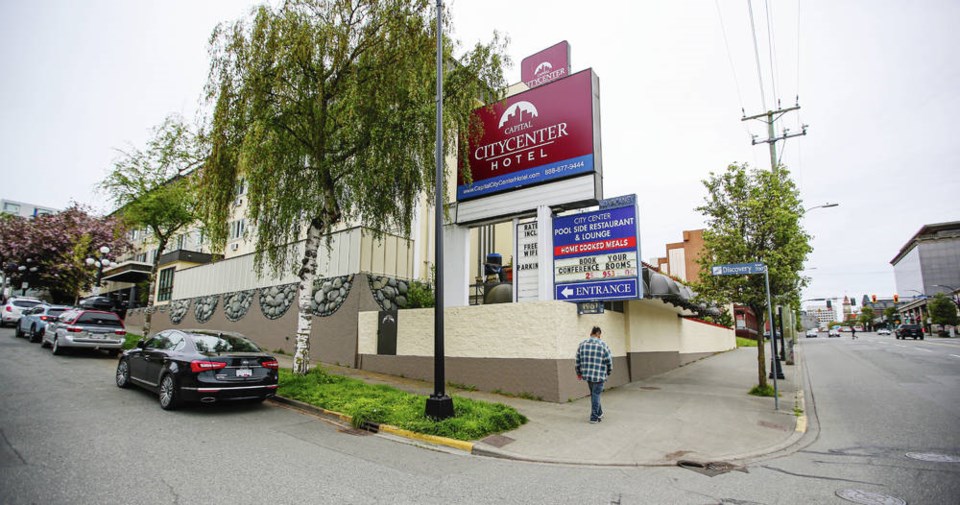B.C. has spent close to $25 million to buy the Capital City Center Hotel and an adjacent parking lot on the north end of Victoria’s downtown for supportive housing, as a ban on around-the-clock camping in city parks is set to come into effect Saturday.
B.C. Housing has been leasing 83 units in the Douglas Street hotel since April 2020, but a fire in November displaced dozens of residents, with the first tenants returning two weeks ago.
“Because this hotel is now in public ownership, the almost 100 people who are safely housed with supports now can breathe a sigh of relief — they won’t have to move at the end of the lease,” Housing Minister David Eby said in a statement Wednesday.
The plan is to convert 94 of the hotel’s 96 rooms to temporary supportive-housing units, with the other two units used for administration. The goal is to eventually turn the entire property into affordable rental housing, Eby said.
The purchase includes the hotel and two adjacent parking lots at 722 and 726 Discovery St. It’s the third hotel purchased by the province in Greater Victoria in the past year, as it focuses on providing housing to address the years-long issue of people living in parks and on the streets.
Fifty-two of the hotel’s units are occupied, as renovations resulting from the fire continue, said Grant McKenzie, spokesman for the Our Place Society, which runs the hotel for the province.
Work is expected to be completed by late June and includes removing stoves so there aren’t any cooking appliances. The fire was started by a guest who wasn’t a B.C. Housing tenant, he said.
Because many residents had to be relocated into other social housing units, it delayed plans to move 220 park campers indoors.
Some of those camping in Beacon Hill Park are expected to move into the hotel, the province said, although tenants will arrive gradually.
Typically, people are stabilized in shelters before moving into supportive housing, McKenzie said. Beacon Hill Park campers may first move into a new shelter on Russell Street in Vic West, set to open in early May, he said. “Once things become stabilized, things really quiet down from them because they are not in survival mode any more.”
Residents will receive supports such as meals, life-skills training, and health and wellness support services.
Staff will be present around the clock to provide security for building residents and the neighbourhood, the province said.
The City of Victoria has banned around-the-clock camping in parks as of Saturday.
Jeff Bray, executive director of the Downtown Victoria Business Association, said given that supportive housing is already in place at the Capital City Center Hotel, the group approves of the purchase.
The issue is not so much about the type of housing, but about making sure appropriate supports are on site, he said, noting concerns at other sites purchased by the province have stemmed from interactions between residents and surrounding neighbourhoods and businesses.
Bray praised the long-term plan for affordable rental units at the site. “There’s lots of people who work in the service sector who can’t possibly afford to live downtown.”
Victoria Mayor Lisa Helps said the city is grateful that the province continues to make “extensive investments” in the community, noting the pandemic has exposed cracks in the social safety net. “Nowhere has this been more visible than in the individuals at risk of or experiencing homelessness.”
But Victoria Coun. Stephen Andrew took to Twitter to accuse the province of breaking a promise not to add more shelter or supportive-housing spaces in the Burnside-Gorge area, where residents have said their neighbourhood has already taken enough. “They need to realize that it’s been shellshocked over the past 18 months,” he said, adding his phone “blew up” with calls from Burnside-Gorge residents after the announcement.
At the same time, he said, Eby has done an excellent job of bringing more units on line. “If they can upgrade this facility to standards of supported housing and affordable housing, that’s great.”
A community advisory committee will oversee the supportive housing’s integration within the community and deal with questions from the neighbourhood, the province said.
B.C. Housing plans to contact neighbourhood associations, businesses and other stakeholders.
The province commissioned an independent appraisal of the Capital City properties, taking into account the current value and redevelopment value.
The land was valued at $23,520,000 in total for the two parcels, the province said. It paid $24.5 million, plus taxes and closing fees.
B.C. earlier bought Paul’s Motor Inn on Douglas Street for close to $15 million and spent $18.5 million to buy the Comfort Inn and Suites on Blanshard Street. It has also spent about $35 million in the capital region to develop other supportive-housing sites.
Last month, it allocated $9.4 million to buy and renovate 225 Russell St. in Vic West, where it plans to create 70 units, to the dismay of neighbours who said they were not consulted and fear their security will be compromised.
Businesses near the Comfort Inn and the former Paul’s spoke out last year about vandalism, trespassing and drug use. Residents living near the Travelodge on Gorge Road East, which is leased by the province, have complained about security issues and noise from that operation.



